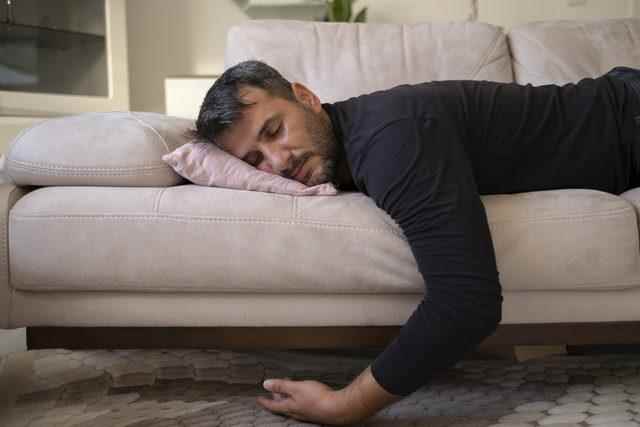Especially employees and students look forward to the holidays to sleep more. We have bad news for those who prefer to sleep for more rest. Sleeping poorly and insomnia are definitely not the same thing, and they both cause a variety of health problems. Hypersomnia, a sleep disorder that causes frequent and deep sleep during the day, is another problem that should not be taken lightly.
THE IMPORTANCE OF BALANCED SLEEP
Balanced sleep is very important for physical and mental health. Sleeping too little or too much can cause brain and heart imbalances.
To better understand what are the problems with sleeping too much, let’s first look at the hours of sleep that are really necessary for our body to stay healthy.
HOW MANY HOURS SHOULD THE RIGHT NIGHT SLEEP BE?
Experts say that a good night’s sleep should be:
- Between the ages of 6 and 13, 7 to 12 hours of sleep is recommended, with the ideal range being 9 to 11 hours.
- Between the ages of 14 and 17, the rest hours may be even less, but should never exceed 7 hours or more than 12 hours.
- Between the ages of 26 and 62, the ideal hours are a minimum of 6 and a maximum of 10.
- Over the age of 65, sleep patterns change, so you can sleep between 5 and 9 hours a night.
In general, 7 to 9 hours of sleep is optimal for rest at any age. If your sleep hours are consistently high or low, your sleep is frequently interrupted, you frequently fall into narcolepsy, or you have particular difficulty waking up, you should seek help for sleep disorders.
REASONS TO SLEEP TOO MUCH
Sleeping too much can be a habit you’ve had over the years or a physical condition that results from an actual sleep disorder. Either way, it is not healthy for our body.
HYPERsomnia
If sleeping too much is a true hypersomnia disorder, you are dealing with a pathological sleep disorder. It is an excessive increase in resting time during the day, including naps.
Many diseases can underlie hypersomnia. Post-traumatic hypersomnia can occur due to a particularly distressing event that destabilizes the nervous system.
Narcolepsy can also cause it. It is a disorder characterized by frequent and deep sleep attacks in the most severe forms with hallucinations and body paralysis upon awakening.

Sleep apnea syndrome can also cause hypersomnia, a respiratory problem that causes breathing to stop during sleep and alters the entire resting cycle.
MEDICINES
Sleeping too much can also be the result of consumption of certain medications such as antihistamines, psychoactive drugs, antidepressants, and others.
DEPRESSION
Some depressive states can lead to an excessive increase in sleep hours, a decrease in some daily activities, pessimism and a state of apathy. Unfortunately, this condition can occur in both young and elderly people.
THYROID PROBLEMS
When the thyroid function is insufficient and therefore we are faced with the problems of hypothyroidism, one of the consequences can be excessive sleepiness. This causes an increase in sleep hours. The thyroid is directly linked to proper metabolic and hormonal functioning: If the thyroid gland does not function as it should, the whole organism becomes weak and needs more rest.
3 HEALTH PROBLEMS CAUSED BY OVERSLEEPING
Too much sleep is really bad for the body. Oversleeping can cause some discomfort and illness over time. According to the results of some studies that shed light on this issue in recent years, the 3 most common health problems are:
dementia
A recent study has shown an association between sleep duration and any negative neurological effects. People who sleep more than 9 hours a night in adulthood have a higher risk of developing forms of dementia such as Alzheimer’s disease.
PARALYSIS
The American Academy of Neurology has published a study that highlights that excessive sleep increases the risk of stroke. The study, conducted in China, tracked the sleep habits of more than 30,000 people with an average age of 62. Of these, about 1,500 had strokes, and the common denominator among them was that they slept well both during the day and at night.

The same study revealed that the health of our brain and circulatory system is closely linked to sleep balance, emphasizing that those who sleep less are also at the same risk.
HEART AND VASCULAR DISEASES
Sleeping more than necessary can also cause heart problems. Studies have shown that oversleeping promotes the production of C-reactive protein, which causes an inflammatory condition that increases the risk of developing atherosclerosis.
HOW ARE SLEEP DISORDERS MANAGED?
Sleeping too much is not good for the body. This type of situation could be a sign of a more serious problem or a trigger for future problems.
If sleep-related problems persist, it is recommended to intervene as soon as possible, both to perform diagnostic tests and to understand which habits and tendencies of the person trigger excessive sleeping. If you think you have a sleep disorder, you should definitely go to a specialist and have a neurological examination.
In general, sleep disorders should not be taken lightly and it is recommended to adopt behaviors that promote balanced rest, including:
